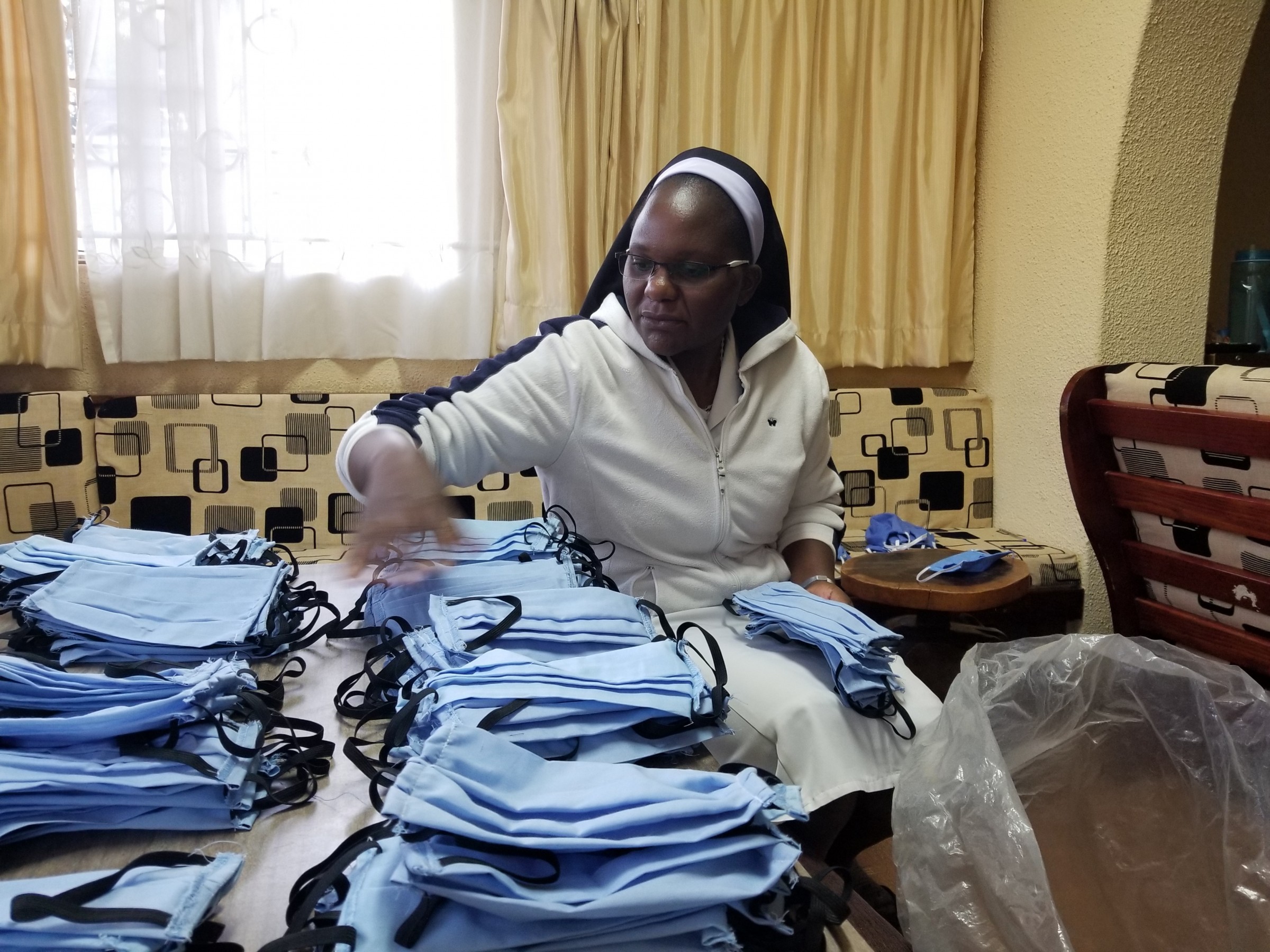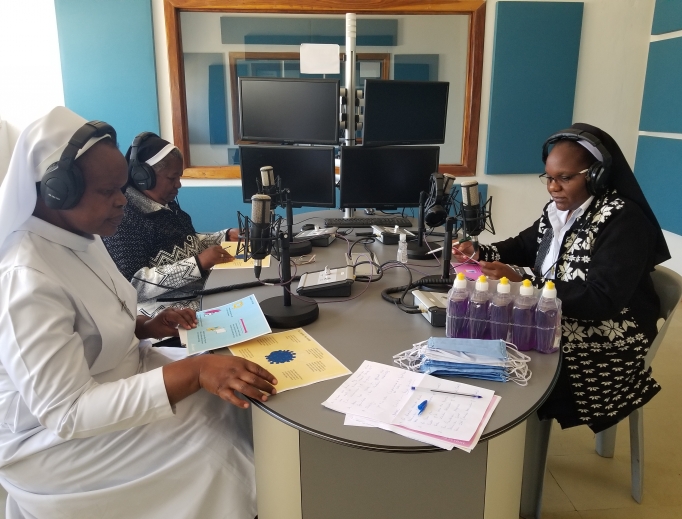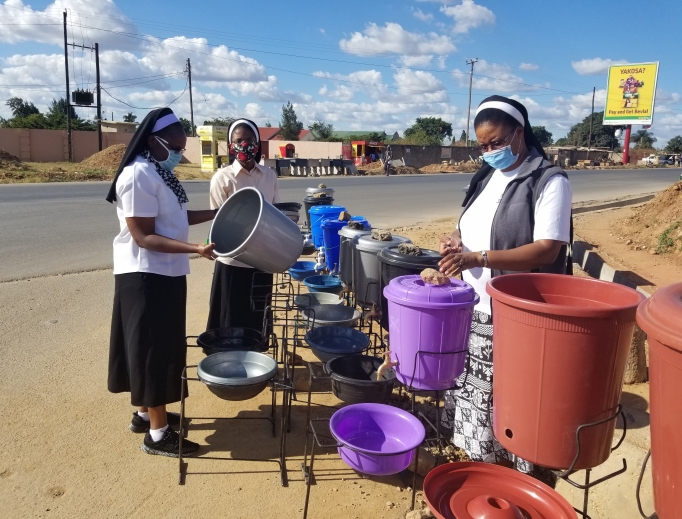Catholic Religious on the Front Lines Combat Spread of COVID-19 in Africa
Orders are taking to the airwaves and engaging in hands-on aid to stop the spread of the virus.

NAIROBI, Kenya — As confirmed cases of COVID-19 continue to surge globally, Catholic religious sisters in Africa have moved in to support their governments’ efforts to combat the pandemic on the continent.
From the onset, experts were concerned about the COVID-19 threat to Africa because of the ill-equipped health systems of African nations, coupled with earlier predictions painting a grim picture of the pandemic’s possible impact on the continent.
An April United Nations Economic Commission for Africa report projected 300,000 could die from COVID-19 in Africa, with the World Health Organization warning that the continent could become the next epicenter.
The African Center for Disease Control (ACDC) reported that, as of July 13, Africa has 594,841 confirmed COVID-19 cases, with 13,238 confirmed COVID-19-related deaths.
So in a bid to prevent further outbreaks, many governments rushed in to impose strict lockdowns and travel restrictions; banning social gatherings, including religious activities; and implementing the closure of schools. As these restrictions took effect, many people in the continent’s vulnerable urban slums and rural areas began to feel the pinch. Many congregations of women religious stepped in and began helping the people in these regions to avoid the worst.
A number of congregations, many of whom are using their own resources, are helping their governments to combat the pandemic. Their services range from providing key COVID-19 messages on radio to opening their own resources of food and hygiene facilities to those most in need.
Radio Zambia
In the maze of conflicting messages about COVID-19, many Africans find religious sisters working on the continent to be trustworthy sources of information about the pandemic — a fact that Alight, a U.S.-based humanitarian aid organization partnering with religious sisters in Africa, has identified and seeks to build on in the fight against the pandemic.
Stephanie Koehne, who coordinates Alight’s initiatives with sisters in Africa, said the organization has been able to link some sisters in Uganda and Zambia through radio to spread accurate information about the pandemic. With this initial success, Koehne told the Register, Alight is now in the process of connecting more sisters to radio to further spread the word about the pandemic.
In Zambia, located in south-central Africa, sisters from six congregations have teamed up and taken to local airwaves to bolster their government’s efforts to combat COVID-19. On radio and on the ground, the sisters are reaching out to communities in rural areas where there is little access to information.
The campaign that was spearheaded by the Dominican Missionary Sisters of the Sacred Heart of Jesus was joined by the Franciscan Missionary Sisters of Assisi, Franciscan Missionaries of Divine Motherhood, Teresian Sisters, Sisters of Mercy and Little Servants of Mary Immaculate.
The sisters are using a radio talk show format in local languages to accurately inform people about the pandemic. Catholic Relief Services (CRS) funded the initial talk shows, but the sisters have also received some funding from Alight to continue with the radio program.
Dominican Sister Astridah Banda and sisters from the other congregations work through the Zambia Association of Sisterhoods to organize and manage the on-air information campaign.
Sister Astridah explained that each show hosts two or three sisters, each of whom uses one of the local dialects spoken in the country. Rural communities are particularly grateful that the sisters chose to custom fit their programs to each region, since other radio stations in the country transmit in English, which is not understandable to many rural communities.
“People started phoning in to thank the sisters for using their languages even before the lines opened,” Sister Banda recalled of their first radio appearance.
The sisters in Zambia have also partnered with an organization called Young Leaders Art Club that shared with them brochures and posters that have proved helpful in their campaign. “The brochures in local languages were especially helpful in the rural communities where radio and TV networks are inaccessible,” Sister Astridah said.
With funding from Alight, the sisters have also donated an assortment of critical equipment and supplies, such as face masks, soap and hand-washing facilities and pamphlets with key COVID-19 messages. They also gave out surgical masks and boxes of surgical gloves to a health facility managed by sisters.

Sister Astridah sorts face masks.
Tanzania, Malawi on the Air
Outside of the initiative coordinated by Alight, some sisters in other parts of Africa are also taking personal initiatives to connect with private and public radio stations — and the programs are having a direct impact on the communities.

Sisters get ready for the COVID-19 program on Radio Maria Yatsani Voice in Lusaka, Zambia.
In the eastern African nation of Tanzania, a sister of Our Lady of Good Counsel is using radio to help families cope with the psychological impact of COVID-19. A trained counselor and psychologist, Sister Grace Mkosamali has been working at St. Augustine University of Tanzania, lecturing on educational psychology at the faculty of education. She is also a counselor at the guidance and counseling unit of the university; and now her skills have become very handy in helping communities to cope in this era of the pandemic.
The nun who has had no previous radio experience was compelled by her desire to help people through her training in psychology. Her first talk on a local private radio station attracted a flood of callers; and, by the end of the show, many listeners were inquiring about one-on-one counseling opportunities.
Seeing Sister Grace’s success, another radio station invited her to their station. Sister Grace now splits her time between the two radio stations. She also posts some of her talks on counseling on YouTube for online users, some of whom are already reaching out to her for personal counseling.
“I really wish to help the people, but it is very challenging due to the social-distancing rules,” she said, adding that the online option does not work for many due to lack of internet access.
“There is urgent need to talk about psychological health, especially at this time when most families are facing a lot of challenges arising from the impact of COVID-19.”
Sister Grace told the Register that she hoped the radio messages would help address the problems people were facing at this time, especially in light of the rising number of domestic-violence cases being reported in Tanzania.
In Malawi, Tanzania’s neighbor to the south, the sisters under their umbrella organization, the Association of Women in Religious Institutes of Malawi (AWRIM), have directed their members to halt activities — such as health-care work and teaching — as precautionary measures to stop the spread of the virus.
But the organization remains actively engaged in spreading the truth about the pandemic by sharing COVID-19 messages with sisters throughout Malawi through radio programming and print media such as posters. So far, AWRIM reports, 1,500 sisters from 35 congregations have been reached with the messages.
‘A Death Too Many’
Despite the precautionary measure, religious sisters are taking, COVID-19 has claimed its first confirmed deaths among nuns on the continent — four nuns, all belonging to the Missionary Sisters of the Precious Blood died in a span of one week in their community’s motherhouse in the Diocese of Mthatha, South Africa.
“These are the first confirmed deaths in our religious communities in Southern Africa, and they serve as a reminder to all of us of the vulnerability of religious communities to COVID-19,” said Sister Nkhensani Shibambu, president of Leadership Conference of Consecrated Life in South Africa. “With the scarcity of religious vocations in the country and in the Church, this is a grievous blow, for the death of one religious is a death too many.”
And with the upsurge of South Africa’s COVID-19 cases, which are the highest on the continent, Sister Nkhensani called on all their members to follow the safety measures and to continue praying for an end to the pandemic “that is gripping our country by the throat.”
“Let us remain vigilant in our communities, keep ourselves and each other safe, especially the most vulnerable members of our communities,” she said.
According to the ACDC’s most recent count, South Africa has reported 276,242 confirmed cases of COVID-19, with 4,079 virus-related deaths.
Kenya’s Poor
In the eastern African nation of Kenya, the Little Sisters of St. Francis (LSOSF) stepped in to assist families with food supplies, water storage tanks and hand-washing facilities. According to LSOSF’s regional superior, Sister Lucy Wanza, they gave out food items such as maize flour, rice, cooking oil and beans and washing bar soap to the needy living in the slums of Kenya’s capital and largest city, Nairobi.

Dominican sisters set up hand-washing buckets to give out to local residents.
“Water is a challenge to the families in some areas, and we thought it critical for them to have somewhere to store some water at this time of the pandemic,” she said.
“If you asked me back then on what we could do to support the poor, I could have simply said: We do not have the means to help the poor,” Sister Lucy recalled to the Register.
But when many needy people began knocking at their gate, the nuns realized they had to do something.
“It was clear that the people who knocked at our doors could neither fulfill the hand-washing directives nor observe the government’s ‘stay at home’ directives, as they had to look for food to feed their families,” Sister Lucy noted.
Withdrawing $1,300 from their savings, the nuns purchased the needed items. But once Kenyans saw what the nuns were doing for the needy, some Kenyan well-wishers moved in to boost the sisters’ efforts.
Another community of the Sisters of Mary Immaculate of Nyeri in Kenya also used their own resources to support the needy by handing out food stuffs such as maize flour, beans and fresh vegetables.
The Nyeri sisters also distributed cooking oil, bars of soap, hundreds of face masks and hundreds of liters of liquid soap that they prepared themselves.
“If God has given us what to eat and use, why not share some of it with those who don’t have?” asked the congregation’s Mother Superior Mary Isaac Waithira Chage.
“Although the lockdown has slowed down our ministries, it has not made the sisters idle,” Mother Mary Isaac said, adding that the sisters had redirected their energies to manual work. Some sisters have taken to work in the congregation’s poultry and hog yards, while others work in the congregation’s farms and orchards.
But more impressive than the Nyeri sisters’ physical work has been their spiritual work. According to Mother Mary Isaac, the sisters are spending more time in prayer and fasting.
“Today our liturgies are very rich and lively, and we really feel the presence of Jesus amidst us,” she said.
Many of the larger Nyeri sisters’ communities are engaged in 24-hour Eucharistic adoration; and according to the superior, the fruits of the sisters’ prayers are evident.
“I have never seen my sisters so close to each other,” she noted joyfully, adding that it had created richness among members. “Community members appreciate one another, and there is a lot of … self-giving.”
At the national level, Archbishop Anthony Muheria, the chairman in charge of religious at the Kenya Conference of Catholic Bishops (KCCB) and ordinary of the Diocese of Nyeri, shared a solidarity message to strengthen the religious sisters in Kenya during this time of pandemic. In the message posted on YouTube, the archbishop called on nuns to use the time of lockdown to deepen their spiritual and communal lives.
“You have been the hands of the Body of Christ to reach and lift and console the People of God — but now it is a moment for you to grow from the inside,” Archbishop Muheria said.
He challenged the nuns to use this time to strengthen their community lives, the life of service, of love and of prayer and to enjoy each other’s company.
“Find ways in which you can add humor to your community life,” the archbishop said, adding that the present moment should bring the sisters together as the Body of Christ.
Register correspondent Sister Grace Candiru of the
Missionary Sisters of Mary Mother of the Church writes from Nairobi, Kenya.
Catholic Schools in Africa Struggle With COVID-19 Restrictions
The COVID-19 pandemic in Africa has taken a toll on Catholic schools across the continent. Religious sisters running many of these schools are finding themselves unable to pay the salaries of their workers.
The sisters are unsure of how long they can continue to pay their contracted employees’ salaries, since they are not able to raise any money due to the closure of their ministries due to restrictions imposed by civil authorities.
But sisters of the Congregation of St. Brigid in the Rustenburg Diocese in South Africa have agreed to continue paying the salaries of their staff, despite the fact that, because of the government’s restriction on movement, the employees are not working at the school.
“My community has decided to pay them, and we are hoping this will encourage them to be more committed once they return to work,” Sister Letta Mosue superior general of the Sisters of St. Brigid, recently posted on a global chat group for nuns.
In Uganda, located in east-central Africa, Sister Florence Busingye, a head teacher in a Catholic school, St. Aloysius Girls Secondary School, in Kitanga, in southern Uganda, had to reach an understanding with her support staff regarding their salaries.
“Since we don’t have any other source of income apart from the money we raise from the students’ fee, we agreed with the staff that they would be paid in arrears once schools resume,” Sister Florence told the Register.
But she said the school has provided accommodation for the workers and gave them permission to feed their families with the food from the school farm.
— Sister Grace Candiru
Kenya Bishops Offer Model Guidelines for COVID-19 Restrictions on Public Worship
As the political leaders of African nations sought to stem the tide of COVID-19 cases,
many religious authorities across the continent followed suit and called on their followers to heed their governments’ directives to observe the protocols put in place.
But now, after four months of social and commercial lockdown, many African countries are seeking to alleviate the resulting economic hardships by cautiously relaxing some of these restrictions. Again following suit, Africa’s bishops are likewise issuing guidelines for multiphased reopenings of Catholic churches on the continent. A model case in point, the Kenyan bishops are seeking to reintroduce public worship with carefully drafted guidelines that also respect current civil mandates restricting public gatherings.
In March, like much of the rest of the world’s bishops, the Kenya Conference of Catholic Bishops (KCCB) banned public celebration of Mass and other religious services. In place of public worship, the Kenyan bishops had organized televised Mass from the Holy Family Basilica in the Archdiocese of Nairobi.
More recently, however, with Kenya’s President Uhuru Kenyatta announcing a phased reopening of Kenya, the KCCB issued liturgical guideline for the reopening of public worship following Kenyatta’s earlier appointment of an interfaith council. The council whose term of service will end in December 2020 is headed by Archbishop Anthony Muheria. Its 16 members are to guide the Kenyan government’s efforts toward the gradual and progressive reopening of in-person religious worship
On July 6, Kenyatta directed that places of worship begin phased reopening for public worship, but with limited attendance at a given celebration.
“In strict conformity with all the applicable guidelines and protocols, including the self-regulating guidelines developed by the Inter-Faith Council, a maximum of 100 participants will be allowed at each worship ceremony,” Kenyatta’s statement read in part. The statement also stressed those congregants who are younger than 13 or older than 58, or who have underlying health conditions, are not allowed to attend public worship services.
The bishops’ June 30 guidelines, which preceded Kenyatta’s statement by a week, were stricter than the civil guidelines in terms of the number of worshippers at any given celebration. The liturgical guidelines directed that churches were only to have a 15% capacity in the first phase of reopening public worship, while the second and third phases would allow 25% and 50% attendance, respectively.
The guidelines further set up other stringent hygiene practices that require regular sanitization of churches, pews and other equipment used during worship, while also providing sanitizers and face masks to those who can’t afford them.
The guidelines, signed by KCCB’s chairman, Archbishop Philip Anyolo, identified education as a key to fighting the pandemic and thus urged church ministers to have a “COVID-19 moment” with their parishioners to pass on messages on preventive measures.
The KCCB guidelines also called for the education of Christians on the guidelines related to the celebration of the sacraments in conformity to social-distancing rules, while limiting the number at weddings and other religious ceremonies to 100 people.
— Sister Grace Candiru
- Keywords:
- africa
- covid-19
- sister grace candiru















